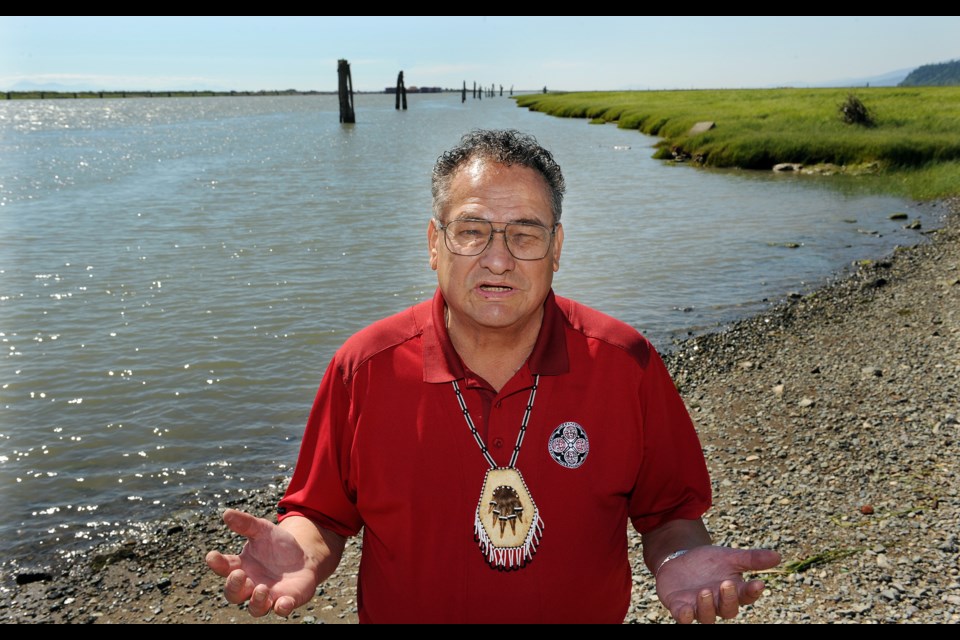Many knew him as the pugnacious leader of the Musqueam Indian Band who fought for what he thought was right for his members — whether it was at the boardroom table to negotiate significant land deals, or on the water where he literally got in a tug of war with fisheries officers in the mid-1990s.
But the image of Ernie Campbell as the tough-talking chief is softened somewhat when his dedication to another part of his life is revealed: For 40 years, the former Golden Gloves boxing champion drove Musqueam children to school and picked them up in the afternoon.
“That’s going to be one of the hardest things for the community — to see somebody else driving the bus is going to be a tough pill to swallow for a lot of people,” said Musqueam Chief Wayne Sparrow, who is a son-in-law to Campbell and replaced him as leader in December 2012.
Campbell, who served a combined 14 years as chief, died Saturday after being admitted to hospital Friday. He died of complications related to diabetes. He was 72.
His death comes less than a year after he decided not to seek another term as chief. In making his decision, he told Sparrow “my fight was done” and he wanted to turn the leadership over to someone else in the band.
Sparrow, 48, said he learned a great deal from Campbell, having watched him negotiate agreements on behalf of the band and deal with concerns raised by band members. Putting personal feelings aside to reach consensus was a key teaching to Sparrow’s education as a member of the band’s council.
“He was firm, strong but respectful and that’s all he asked for in return,” said Sparrow, pointing to the agreement reached for the 2010 Winter Olympics in which the band was ensured economic, social and cultural benefits from the Games.
Campbell negotiated another landmark agreement in 2008 that saw the provincial government turn over the University of B.C. Golf Course lands, property near Sea Island Way in Richmond and two parcels in Pacific Spirit Regional Park. The deal included a payment of $20.3 million.
“To get those chunks of land back was quite an accomplishment for our community,” said Sparrow, who recalled a meeting that then-premier Gordon Campbell and the chief had at a golf course to discuss the band’s needs.
Sparrow said the former premier, who is now Canada’s high commissioner in London, sent a telegram over the weekend to Campbell’s family, expressing his condolences.
Campbell told the Courier in an email from London the former chief was a tenacious leader with a sense of humour. The pair often had what the former chief called “summit meetings” over coffee at the Musqueam golf course. “I will miss him, his chuckle, the twinkle in his eye,” he wrote, noting the chief referred to him as “cousin.”
Premier Christy Clark and Mayor Gregor Robertson, who considered Campbell a friend and supported the band’s recent successful fight to stop a condominium development in Marpole, issued public statements over the weekend.
“Chief Campbell was a thoughtful, determined leader who helped build bridges and foster greater understanding between all cultures,” Robertson said. “I had great respect for how he conducted himself and always enjoyed our conversations.”
Clark described Campbell as one of B.C.’s “foremost First Nations leaders” and said “his strong voice and unswerving leadership ensured the concerns of his people remained at the forefront through issues that could have divided us.”
That style of leadership not only played out in the boardroom but on the water.
In one memorable exchange in the mid-1990s on the Fraser River, Campbell engaged in a tug of war with Department of Fisheries and Oceans officers after they attempted to pull up fishing nets set in the water.
More recently, Sparrow said, Campbell’s leadership led to the construction of a new $10 million community centre, cultural centre and sports fields — all venues that have brought band members a sense of pride.
“He knew how to negotiate, he knew what we needed and this was the outcome,” he said, noting the ceremony to mark Campbell’s death will occur Wednesday in the community centre’s gymnasium.
Campbell, who attended St. Paul’s residential school and was a graduate of Magee high school, leaves behind his wife, Carol, one son, three daughters, two grandsons and a granddaughter.
Note: This story has been updated since it was first posted Oct.28.



